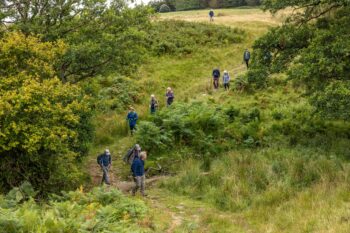In a review article published in Nature, researchers have introduced a new term to describe the importance of seabirds across land and marine ecosystems: the circular seabird economy.
Although seabirds spend most of their lives at sea, they return to land to breed, often forming colonies of thousands of individuals. This influx of birds, bringing their guano, or droppings, feathers and eggshells to land constitutes a transfer of ocean-derived nutrients, including phosphorous, carbon, nitrogen and calcium.
“By eating at sea, and then pooping at breeding colonies, seabirds are estimated to transfer as much nitrogen and phosphorus from sea to land as all commercial fisheries combined,” Nick Holmes, study co-author and associate director for oceans at the NGO The Nature Conservancy, told Mongabay by email.
This surge in nutrients on land feeds soil and helps “shape plant communities, which in turn support diverse insect, bird, and reptile populations,” David Will, study co-author and senior director of impact and innovation at U.S.-based nonprofit Island Conservation, told Mongabay by email.
“In Antarctica and the Southern Ocean, seabirds contribute over 80% of available nutrients to land and sea ecosystems, making them the primary drivers of productivity in some of the planet’s harshest environments,” Will added. “When new islands emerge from the sea, they are empty until seabirds show up with seeds and nutrients and jump start life and keep it going.”
The flow of nutrients doesn’t just go from ocean to land. Studies show that a significant amount washes back the other way, fueling marine food webs as well.
Compared to islands without seabirds, marine environments near islands with seabirds have “coral reefs recovering faster after bleaching events, fish growing faster, higher fish biomass, and increased macroalgae,” Holly Jones, lead author of the study and an ecologist at Northern Illinois University, U.S., told Mongabay in an email.
Healthier marine life also means greater climate resilience, Jones added. For example, “coral reefs grow faster and calcify quicker, both of which will be important in the face of increasing extreme weather events and sea level rise,” she said.
Despite their importance, nearly a third of seabird species are at risk of extinction, the researchers note. Their main threats include invasive rats and cats on islands that eat the birds’ eggs and chicks. At sea, they often get caught as fisheries bycatch. Other threats to seabirds include plastic pollution, overfishing of their prey species, and climate change, the researchers note.
Because seabirds are crucial to so many ecosystems, Jones said, protecting them “is one of the most effective strategies we have to make a huge impact on land, at sea, and in our own communities.”
“This paper shows how restoring seabirds doesn’t just help the birds — it helps entire ecosystems recover and thrive,” Will added in a press release.
Banner image: Puffins near their breeding burrows near Dunfermline, Scotland. Image by Steve Garvie via Wikimedia Commons (CC BY-SA 2.0).





